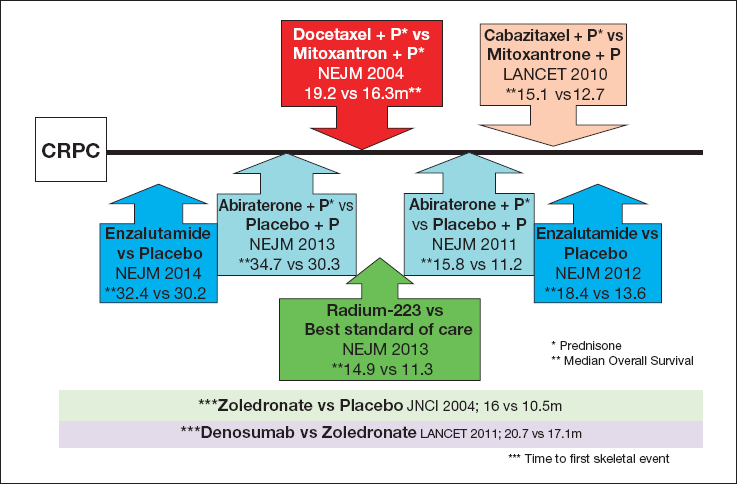BJMO - 2019, issue Special, march 2019
Prof. dr. Silke Gillessen
Since 2010, several new agents have joined the armamentarium for the treatment of metastatic castration-resistant prostate cancer (mCRPC) (Figure 1).1–7 This had dramatically improved the outcome for patients with mCRPC, but also confronts physicians with the question of how to optimally sequence the different therapeutic options. In addition to this, the increasing use of abiraterone acetate (AA) and docetaxel (and in the near future perhaps also enzalutamide) in the castration-sensitive metastatic prostate cancer (PCa) setting will further complicate this therapeutic sequencing. During BMUC 2019, dr. Silke Gillessen gave an overview of the available clinical data that can be used to steer the treatment choices in the mCRPC setting. Unfortunately, none of the pivotal trials evaluating the novel treatment agents compared the experimental agent against a regimen that would be considered standard of care nowadays. Moreover, none of the trials included patients who received androgen deprivation therapy (ADT) plus AA or docetaxel in the hormone sensitive setting.

FIGURE 1. Approved systemic therapies for mCRPC.
Read moreBJMO - 2019, issue Special, march 2019
S. Siva MD, PhD
Immunotherapy has become a successful modality in the treatment of a number of cancers. Still, generally not more than one third of the patients respond well to this type of therapy. To improve the outcome, researchers are evaluating combinations with other modalities, such as radiotherapy. During BMUC 2019, radiation oncologist dr. Shankar Siva presented the results obtained with local radiotherapy and immunotherapy, and discussed the optimal sequence, timing and dosing of this combination treatment.
Read moreBJMO - volume 13, issue 2, march 2019
H. Van Poppel MD, PhD
Marking its decade-long dedication to the goal of pursuing multidisciplinary collaboration, the 10th European Multidisciplinary Congress on Urological Cancers (EMUC18) examined the best practices, advances and future prospects in managing genitourinary malignancies. The congress also identified current dilemmas and addressed gaps in clinical practice.
(BELG J MED ONCOL 2019;13(2):63–65)
Read moreBJMO - volume 13, issue 2, march 2019
Tom Feys MBA, MSc
From the 4–8th of December, the San Antonio Riverwalk again formed the background of the most important breast cancer congress in the world. This report will summarise eight top stories presented during the 2018 San Antonio Breast Cancer Symposium (SABCS). For a more complete overview of studies presented at the meeting, we refer to the congress website www.sabcs.org.
(BELG J MED ONCOL 2019;13(2):66–71)
Read moreBJMO - volume 12, issue 8, december 2018
V. Surmont MD, PhD
The introduction of immune checkpoint inhibitors in the treatment arsenal of NSCLC patients revolutionised the way these patients are treated. Similarly, the development of several next-generation tyrosine kinase inhibitors, targeting activating EGFR and ALK mutations/rearrangements, has changed the treatment paradigm for patients with oncogene-driven NSCLC. While these agents were initially used in the relapsed setting, both immune checkpoint inhibitors and next-generation TKIs were now successfully tested in the first-line treatment of metastatic NSCLC patients. ESMO 2018 featured the presentation of a long list of these trials. In addition, efforts are being made to improve the outcome of patients with stage III NSCLC and also in this setting interesting data were presented.
Read moreBJMO - volume 12, issue 8, december 2018
H. Wildiers MD, PhD, Tom Feys MBA, MSc, K. Punie MD
During ESMO 2018 an entire presidential session was dedicated to breast cancer. In addition to exciting immuno-oncology data in the treatment of triple negative breast cancer (TNBC), this session featured the presentation of the overall survival (OS) data of the phase III PALOMA-3 trial, evaluating the alpha-specific PI3K-inhibitor alpelisib in PI3KCA-mutant advanced breast cancer, and results of a clinical trial demonstrating improved outcomes when adding a histone deacetylase (HDAC) inhibitor to exemestane in hormone-receptor positive advanced breast cancer. In early breast cancer it was further demonstrated that non-compliance with adjuvant endocrine treatment is an under-appreciated and under-reported problem. In addition, the HOBOE-2 adds to the evidence that adjuvant bisphosphonates also improve the disease-free survival (DFS) in premenopausal luminal breast cancer patients who have received ovarian function suppression combined with an aromatase inhibitor. Finally, a subgroup analysis of the ShortHER trial suggests that for low- and intermediate risk cancer HER2-positive early breast cancer, 9 weeks of trastuzumab might be non-inferior to the standard 1-year treatment duration. However, the interpretation of this trial is challenging and as such, one year of trastuzumab should remain the standard for now.
Read moreBJMO - volume 12, issue 8, december 2018
P. Specenier MD, PhD
The 2018 annual meeting of the European Society for Medical Oncology (ESMO) turned out to be a grand cru for head and neck cancer, with two abstracts in this disease entity presented during the presidential sessions of the meeting. These two presentations, one on the use of immune checkpoint inhibition in the frontline treatment of recurrent/metastatic (R/M) Squamous Cell Carcinoma of the Head and Neck (HNSCC) and one evaluating treatment de-escalation in low-risk, p16-positive oropharyngeal cancer, form the lion’s share of this report. In addition to this data were presented of clinical trials looking at the potential of durvalumab plus danvatirsen, M7824, tipifarnib and SD-101 in the treatment of R/M SCCHN.
Read more